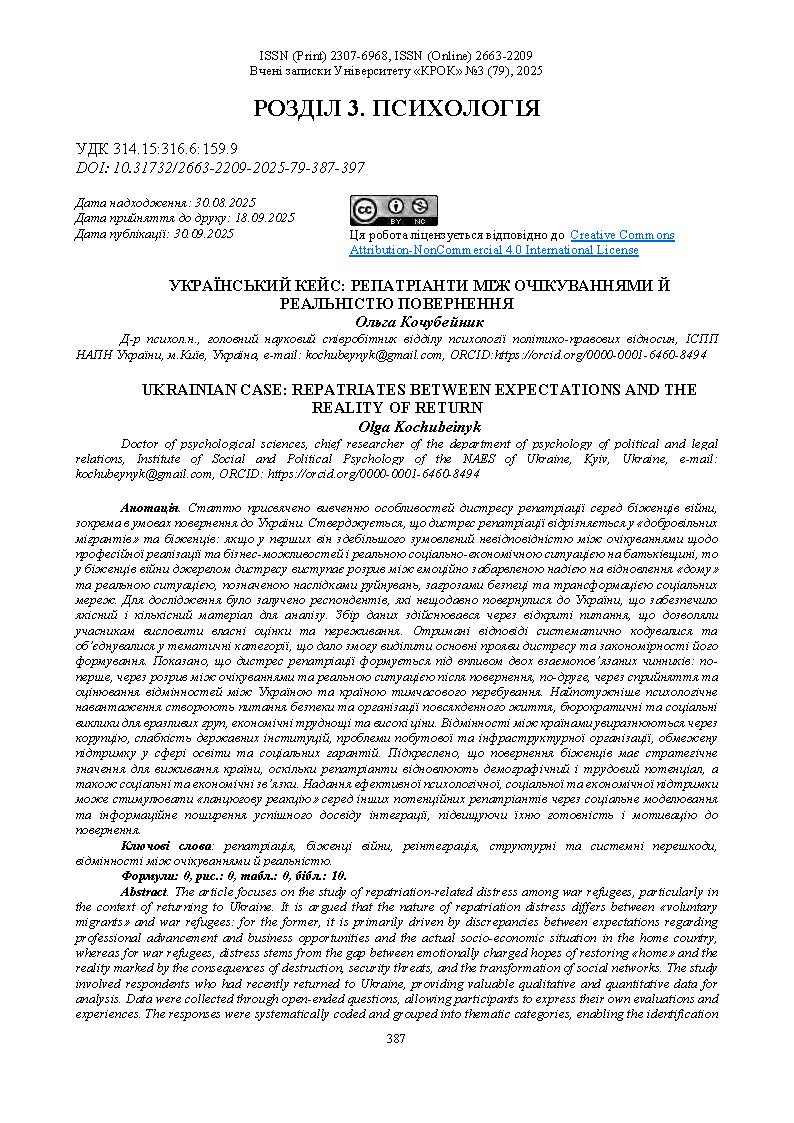UKRAINIAN CASE: REPATRIATES BETWEEN EXPECTATIONS AND THE REALITY OF RETURN
DOI:
https://doi.org/10.31732/2663-2209-2025-79-387-397Keywords:
repatriation, war refugees, reintegration, structural and systemic barriers, discrepancies between expectations and realityAbstract
The article focuses on the study of repatriation-related distress among war refugees, particularly in the context of returning to Ukraine. It is argued that the nature of repatriation distress differs between «voluntary migrants» and war refugees: for the former, it is primarily driven by discrepancies between expectations regarding professional advancement and business opportunities and the actual socio-economic situation in the home country, whereas for war refugees, distress stems from the gap between emotionally charged hopes of restoring «home» and the reality marked by the consequences of destruction, security threats, and the transformation of social networks. The study involved respondents who had recently returned to Ukraine, providing valuable qualitative and quantitative data for analysis. Data were collected through open-ended questions, allowing participants to express their own evaluations and experiences. The responses were systematically coded and grouped into thematic categories, enabling the identification of key manifestations of distress and patterns of its formation. The findings indicate that repatriation distress is shaped by two interrelated factors: first, the gap between expectations and the actual post-return situation, and second, the perception and assessment of differences between Ukraine and the country of temporary residence. The most intense psychological burden arises from issues of safety and daily life organization, bureaucratic and social challenges for vulnerable groups, economic difficulties, and high costs. Differences between countries are highlighted by corruption, weak state institutions, challenges in daily and infrastructure organization, and limited support in education and social guarantees. The study emphasizes that refugee return is of strategic importance for the country’s survival, as repatriates restore demographic and labor potential, as well as social and economic networks. Providing effective psychological, social, and economic support may stimulate a «chain reaction» among other potential repatriates through social modeling and the dissemination of successful integration experiences, enhancing their readiness and motivation to return.
Downloads
References
Blomqvist Mickelsson, T. (2025). Ukrainian refugees’ differentiated treatment: A critical and systematic review. Global Networks, 25(1), Article e12502. https://doi.org/10.1111/glob.12502
El-Asri, Samira, Karfa, El, & Farhane, Hamza. (2024). Dealing with Reverse Culture Shock after Cultural Exchange: Contributing Factors and Coping Strategies. Journal of Psychology and Behavior Studies. 4. 51–56. 10.32996/jpbs.2024.4.1.6.
Fanari, A., & Segrin, C. (2023). Reentry Shock and the Role of Communication in Psychological Health: A Study of Abrupt Reentry During the COVID-19 Pandemic. Journal of Intercultural Communication Research, 52(5), 493–512. https://doi.org/10.1080/17475759.2023.2239819
Gaw, K. F. (2000). Reverse culture shock in students returning from overseas. International Journal of Intercultural Relations, 24(1), 83–104. https://doi.org/10.1016/S0147-1767(99)00024-3
Geeraert, N., & Demoulin, S. (2013). Acculturative stress or resilience? A longitudinal multilevel analysis of sojourners’ stress and self-esteem. Journal of Cross-Cultural Psychology, 44(8), 1241–1262. https://doi.org/10.1177/0022022113478656
Liem, A., Renzaho, A. M. N., Hannam, K., Lam, A. I. F., & Hall, B. J. (2021). Acculturative stress and coping among migrant workers: A global mixed-methods systematic review. Applied psychology. Health and well-being, 13(3), 491–517. https://doi.org/10.1111/aphw.12271
Martin, J. (2009). Patterns of communication in three types of reentry relationships: An exploratory study. Western Journal of Speech Communication. 50. 10.1080/10570318609374224.
Ozola Cīrule, I., & Martinsone, B. (2023). The Relationship among Re-Entry Shock, Coping Modes, and Psychological Re-Adjustment of Adult Latvian Return Migrants. 19-38. 10.22364/htqe.2023.02.
Ozola-Cīrule, I., & Martinsone, B. (2025). Identification of stress factors in returning migrants in Latvia. Frontiers in psychology, 15, 1515406. ttps://doi.org/10.3389/fpsyg.2024.1515406
Sussman, N. M. (2001). Repatriation transitions: Psychological preparedness, cultural identity, and attributions among American managers. International Journal of Intercultural Relations, 25(2), 109–123. https://doi.org/10.1016/S0147-1767(00)00046-8

Downloads
Published
How to Cite
Issue
Section
License

This work is licensed under a Creative Commons Attribution-NonCommercial 4.0 International License.

